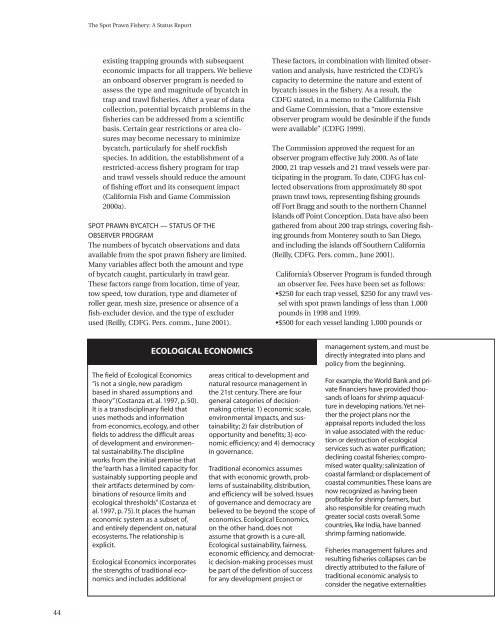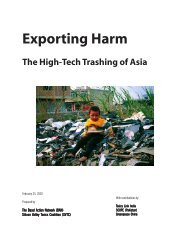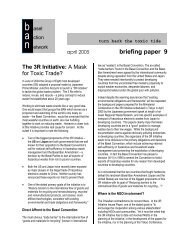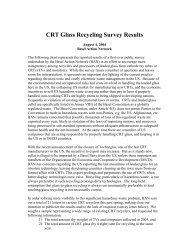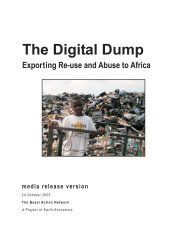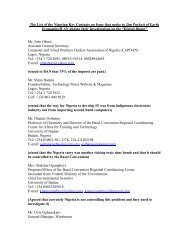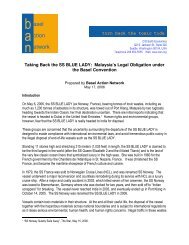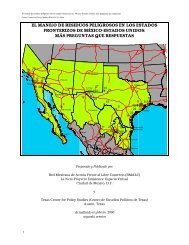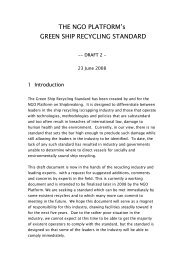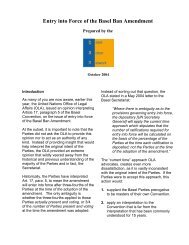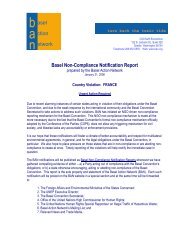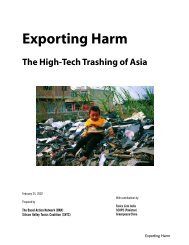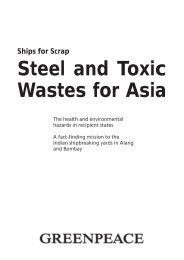The Spot Prawn Fishery The Spot Prawn Fishery - Basel Action ...
The Spot Prawn Fishery The Spot Prawn Fishery - Basel Action ...
The Spot Prawn Fishery The Spot Prawn Fishery - Basel Action ...
You also want an ePaper? Increase the reach of your titles
YUMPU automatically turns print PDFs into web optimized ePapers that Google loves.
44<br />
<strong>The</strong> <strong>Spot</strong> <strong>Prawn</strong> <strong>Fishery</strong>: A Status Report<br />
existing trapping grounds with subsequent<br />
economic impacts for all trappers. We believe<br />
an onboard observer program is needed to<br />
assess the type and magnitude of bycatch in<br />
trap and trawl fisheries. After a year of data<br />
collection, potential bycatch problems in the<br />
fisheries can be addressed from a scientific<br />
basis. Certain gear restrictions or area closures<br />
may become necessary to minimize<br />
bycatch, particularly for shelf rockfish<br />
species. In addition, the establishment of a<br />
restricted-access fishery program for trap<br />
and trawl vessels should reduce the amount<br />
of fishing effort and its consequent impact<br />
(California Fish and Game Commission<br />
2000a).<br />
SPOT PRAWN BYCATCH — STATUS OF THE<br />
OBSERVER PROGRAM<br />
<strong>The</strong> numbers of bycatch observations and data<br />
available from the spot prawn fishery are limited.<br />
Many variables affect both the amount and type<br />
of bycatch caught, particularly in trawl gear.<br />
<strong>The</strong>se factors range from location, time of year,<br />
tow speed, tow duration, type and diameter of<br />
roller gear, mesh size, presence or absence of a<br />
fish-excluder device, and the type of excluder<br />
used (Reilly, CDFG. Pers. comm., June 2001).<br />
<strong>The</strong> field of Ecological Economics<br />
“is not a single, new paradigm<br />
based in shared assumptions and<br />
theory” (Costanza et. al. 1997, p. 50).<br />
It is a transdisciplinary field that<br />
uses methods and information<br />
from economics, ecology, and other<br />
fields to address the difficult areas<br />
of development and environmental<br />
sustainability. <strong>The</strong> discipline<br />
works from the initial premise that<br />
the “earth has a limited capacity for<br />
sustainably supporting people and<br />
their artifacts determined by combinations<br />
of resource limits and<br />
ecological thresholds” (Costanza et<br />
al. 1997, p. 75). It places the human<br />
economic system as a subset of,<br />
and entirely dependent on, natural<br />
ecosystems. <strong>The</strong> relationship is<br />
explicit.<br />
Ecological Economics incorporates<br />
the strengths of traditional economics<br />
and includes additional<br />
ECOLOGICAL ECONOMICS<br />
areas critical to development and<br />
natural resource management in<br />
the 21st century. <strong>The</strong>re are four<br />
general categories of decisionmaking<br />
criteria: 1) economic scale,<br />
environmental impacts, and sustainability;<br />
2) fair distribution of<br />
opportunity and benefits; 3) economic<br />
efficiency; and 4) democracy<br />
in governance.<br />
Traditional economics assumes<br />
that with economic growth, problems<br />
of sustainability, distribution,<br />
and efficiency will be solved. Issues<br />
of governance and democracy are<br />
believed to be beyond the scope of<br />
economics. Ecological Economics,<br />
on the other hand, does not<br />
assume that growth is a cure-all.<br />
Ecological sustainability, fairness,<br />
economic efficiency, and democratic<br />
decision-making processes must<br />
be part of the definition of success<br />
for any development project or<br />
<strong>The</strong>se factors, in combination with limited observation<br />
and analysis, have restricted the CDFG’s<br />
capacity to determine the nature and extent of<br />
bycatch issues in the fishery. As a result, the<br />
CDFG stated, in a memo to the California Fish<br />
and Game Commission, that a “more extensive<br />
observer program would be desirable if the funds<br />
were available” (CDFG 1999).<br />
<strong>The</strong> Commission approved the request for an<br />
observer program effective July 2000. As of late<br />
2000, 21 trap vessels and 21 trawl vessels were participating<br />
in the program. To date, CDFG has collected<br />
observations from approximately 80 spot<br />
prawn trawl tows, representing fishing grounds<br />
off Fort Bragg and south to the northern Channel<br />
Islands off Point Conception. Data have also been<br />
gathered from about 200 trap strings, covering fishing<br />
grounds from Monterey south to San Diego,<br />
and including the islands off Southern California<br />
(Reilly, CDFG. Pers. comm., June 2001).<br />
California’s Observer Program is funded through<br />
an observer fee. Fees have been set as follows:<br />
•$250 for each trap vessel, $250 for any trawl vessel<br />
with spot prawn landings of less than 1,000<br />
pounds in 1998 and 1999.<br />
•$500 for each vessel landing 1,000 pounds or<br />
management system, and must be<br />
directly integrated into plans and<br />
policy from the beginning.<br />
For example, the World Bank and private<br />
financiers have provided thousands<br />
of loans for shrimp aquaculture<br />
in developing nations.Yet neither<br />
the project plans nor the<br />
appraisal reports included the: loss<br />
in value associated with the reduction<br />
or destruction of ecological<br />
services such as water purification;<br />
declining coastal fisheries; compromised<br />
water quality; salinization of<br />
coastal farmland; or displacement of<br />
coastal communities.<strong>The</strong>se loans are<br />
now recognized as having been<br />
profitable for shrimp farmers, but<br />
also responsible for creating much<br />
greater social costs overall. Some<br />
countries, like India, have banned<br />
shrimp farming nationwide.<br />
Fisheries management failures and<br />
resulting fisheries collapses can be<br />
directly attributed to the failure of<br />
traditional economic analysis to<br />
consider the negative externalities


